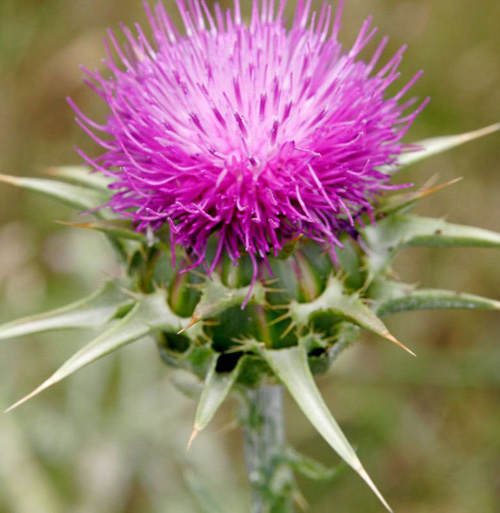Benefits of Milk Thistle
Milk thistle is an herbal remedy dating back to the Greco-Roman era, associated with liver health. The plant, commonly found in the U.S., has red and purple flowers and brown, spotted fruit.
As organs go, the liver is extraordinarily resilient, often capable of recovering from injury and even regenerating itself if needed. Cirrhosis of the liver occurs after significant long-term damage has occurred, often from chronic infection, toxin intake or exposure, and fatty deposition. Over time, the damage results in scarring of the liver, limiting or stopping the organ’s ability to repair itself. Herbalists and some physicians use milk thistle to benefit early liver damage, and preserve its function to protect against the formation of cirrhosis.
Multiple studies have shown benefit in prescribing milk thistle to those with liver disease, particularly those with damage sustained from alcohol abuse [Source: Ferenci, Feher, Salmi]. Typically these studies were conducted to evaluate the ability of milk thistle to normalize elevated blood tests for the liver, a sign of organ damage. Still, other studies have not shown great improvement in the overall health of the liver when linked to other specific causes such as the viral infection hepatitis C, or with preexisting damage like established cirrhosis [Source: Jacobs, Pares].
Cancer research is now exploring the potential benefits of milk thistle. Most of the research to date has focused on skin tumor treatment or prevention in animals, with milk thistle demonstrating a positive impact [Source: Zhao, Lahiri-Chatterjee, Wright, Pinnell]. The hope is that current and future human studies will clarify what types of cancer can be most impacted by this herbal method [Source: Bhatia]. Though not available in the States, milk thistle has long been used intravenously in Europe to treat mushroom poisoning.
Milk thistle appears to be very safe, with tests showing no significant drug interactions and relatively high tolerance levels [Source: Jacobs, Rainone]. Mild stomach upset is the only documented side effect.
Milk thistle is part of the aster plant family, which includes thistles, artichokes and daisies [Source: Pinnell]. Clearly, a person with allergies specific to this group should avoid this supplement.
Silymarin is thought to be the primary active ingredient in milk thistle. The dose believed to be most effective for liver protection is 420 mg of silymarin daily. A good herbal product should display exactly how much silymarin is contained in each dose, typically 80 percent. The conscious consumer will need to do some math to determine how much is needed for the proper dosage. For example, if a product contains 175 mg of 80 percent silymarin per tablet, each tablet contains 140 mg of silymarin and four tablets should be taken each day.
As the medical and patient community awaits further research, milk thistle appears to be a very safe option for liver-related ailments, especially for those who have, or are using liver-toxic substances, like alcohol or medications. Milk thistle can be used in an attempt to protect the liver from the potential damage of medications like acetaminophen, cholesterol-lowering statin drugs and the seizure medicine, phenytoin. Just another reason a little milk, thistle included, does a body good.



